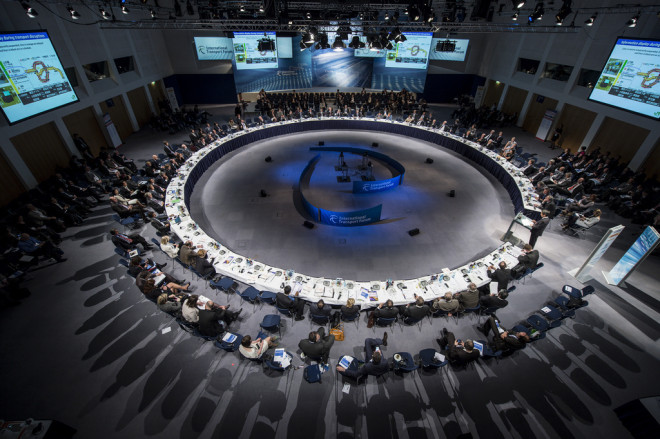
ITF roundup
How to get ministers to talk about cycling? Read our report of the International Transport Forum 2013.
Even ECF, the world’s largest cycling advocacy organization, does not get an opportunity to directly talk to national transport ministers every day. Once a year, however, the International Transport Forum’s (ITF) annual summit makes it possible. From 22 to 24 May, the conference brought together transport ministers from over 50 countries to discuss this year’s overarching theme, “Funding Transport”, in Leipzig, Germany.
They were joined by policy makers from the World Bank, the UN, the OECD, the EU and a wide range of businesses, bankers, NGOs and public bodies.
ECF played an active role at the conference for the fourth year in a row. “After all, cycling remains unchallenged as the cheapest form of sustainable transport,” says Dr. Bernhard Ensink, ECF Secretary General. “Our Federation thus deserves to be a prominent actor at the ITF summit. We would like to thank our members and sponsors, without whom we could not fulfill this role,” he adds.
In particular ECF was being supported by cycle parking industry members Velopa and Bfree, who provided an opportunity to show that there is more to infrastructure than just concrete.
During the talks it emerged indeed that we cannot continue developing transport infrastructure as we historically did. Building roads, railways and airports as we have done in the past does not deliver for sustainability, quality of life or even growth in developing countries.
What’s more, the world is becoming increasingly urban, so there needs to be a paradigm shift away from inter-city schemes such as highways towards more regional and urban transportation. But the lobby from the international business and civil engineering sectors, interested in building large-scale transport corridors, remains huge and powerful.
At the same time, the development of transport infrastructure is suffering from the same repercussions of the financial crisis as other investments do. Funding is harder to attract, both from the public and the private sector. The Multinational Development Banks, however, are expecting to spend as much as $175 billion globally on transport projects in the coming years, but only if they are sustainable.
Cycling, as it became clear as the ITF summit went on, has the potential to be a game-changer in this story. ECF was able to keep demonstrating the fantastic economic case for cycling – a low-cost, high-return investment that will work in every environment.
“Without a doubt policy makers are increasingly aware of the potential of cycling as well,” Dr. Ensink claims. As if to prove he is right, the governments of Germany, Slovakia and the Czech Republic committed in complete unanimity to having national cycling plans at the heart of their transport policies, something ECF has long been arguing for. Addressing ministers individually and sending an open letter to them, ECF made clear that countries investing in cycling from central funds have proven to have higher levels of cycling growth than those who do not.
The Czech and Slovak ECF member groups provided significant input to the brand new cycling plans in those countries. The plans also benefited from the “CentralMeetBike” project which aims to share German cycling expertise with the neighbouring Eastern European countries.
ECF was also able to address ministers concerning other issues than funding, however. “During a side event on road safety, I brought up the 30km/h campaign,” Dr. Ensink recalls. “I got support from the Swedish transport minister, who stressed that her country is focusing on safe ‘door-to-door’ cycling infrastructure.” The two were joined by Marc Juhel, Sector Manager for transport at the World Bank, who also agreed on the importance of urban infrastructure that protects cyclists and pedestrians.
Thanks to ECF member ADFC and bike sharing company nextbike, ECF had one last opportunity to talk directly to policy makers and investors during the traditional concluding bike tour of Leipzig with the city’s mayor. While getting a first hand experience of how easy it is to get around a modern city by shared bikes, maybe some multinational development bank advisors are now rethinking the way they are going to spend their many millions on infrastructure in the developing world.
There are opportunities that are not to be missed. Needless to say, ECF will be back at the ITF summit next year.
- Log in to post comments
Contact the author
Recent news!
Upcoming events
Contact Us
Avenue des Arts, 7-8
Postal address: Rue de la Charité, 22
1210 Brussels, Belgium










